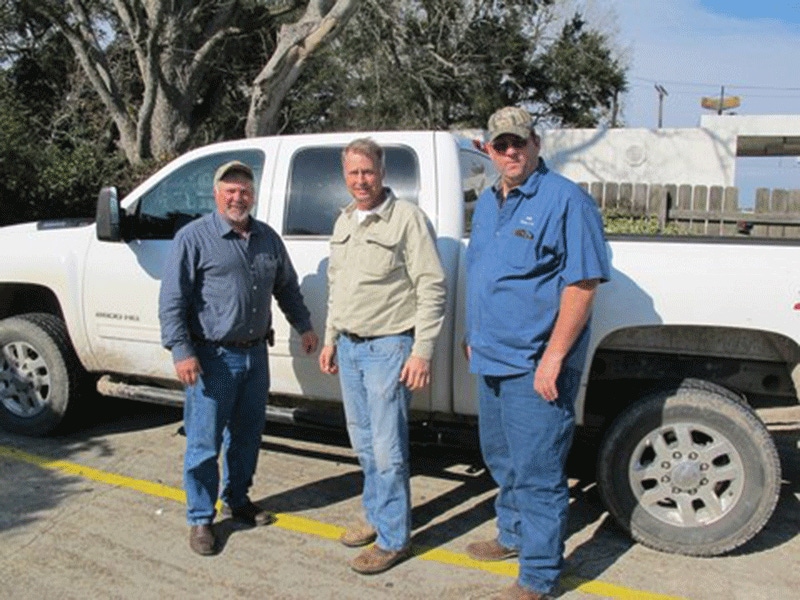April 7, 2015

It is late January, a time when many farmers are thinking about crop selection for the spring.
But in Lacassine, La., longtime farmers Bill and Tim Wild and Glen and Wynn Watkins are busy delivering trucks of paddy rice to the South Louisiana Rail Facility (SLRF). The rice is railed that same week as part of a 50-car order bound for some of the largest rice customers in Mexico.
The Wild and Watkins brothers are all members of the SLRF, a limited liability corporation operated cooperatively by local farmers.
Five years ago, the area’s rice farmers were concerned about the limited options for marketing their crop.
“In South Louisiana, we are really limited to growing rice due to the soil and weather,” Bill Wild said. “Hearing about an abandoned sugar factory with two rail spurs less than a mile off the mainline held the answer.”
It took the vision of a handful of farmers, the teamwork of 150 local rice producer-members and several related agri-businesses to transform an abandoned factory into the state-of-the-art rice facility it is today. The facility includes four 40,000-bushel storage units and a computerized conveyer and elevator system that can load an 80-ton railcar in just 10 minutes.
The terminal is centrally located with more than 200 rice farms within an hour’s drive of the depot.
“Farmer’s like the fact that they can drop off up to six truckloads per day, whereas some mills only allow two trucks a day,” Glen Watkins says. “And best of all is the price. Today, we’re getting a premium for our identity-preserved paddy rice of 86 cents per hundredweight.”
Among SLRF’s investors is RiceTec, Inc., which commercializes hybrid rice seed. The company has also been active in finding additional markets for coastal rice producers.

Perspectives of the Mississippi Delta — photos by Rory Doyle
“Any market for rice that we can develop is good for the farmer and good for the local economy,” says Cullen Minter, regional manager for RiceTec Inc.
Each investor contributed $5,000 to develop the facility, which then drew support and funding from the Louisiana Agricultural Financial Authority, led by Commissioner Mike Strain. The facility is in its third year of operation and growing rapidly.
“Today, the demand is there for all we can sell,” said Mark Pousson, who oversees the rail facility. “They love our rice in Mexico.”
Pousson said several factors make the facility’s rice marketable in Mexico. Including speed of delivery. “Turnaround time is essential for keeping up with demand, and this place is built for speed. Rice being delivered to the facility today can be loaded and delivered to Mexico City in just 10 to 12 days.”
But what their customers like most is the rice itself. “Our buyers appreciate the quality and consistency of the paddy rice,” Pousson said.
Identity preservation is a key to that quality. “Since most growers in the area have their own drying equipment, we can get the paddy rice directly from each of them, so there is no comingling. And while we pay a premium for that IP rice, we can still provide it at a very competitive price to Mexico.”
“It is one variety, all the way from the farm to railcar to the mills in Mexico. We ship mostly hybrids, either Clearfield XL729 or XL745. By identity preserving it, the rice ends up having the same milling and cooking characteristics. It mills more evenly and will cook properly since the finished product is all the same,” said Winn Watkins.
There are other reasons to grow hybrids, according to Tim Wild. “It’s not just the extra yield, but their disease package, potential for a ratoon crop and suitability for raising crawfish. We can cut another 25 bushels then turn around in time to get a crawfish crop.”
Pousson sees an opportunity to expand beyond local farmers.
“Ultimately, we would like to purchase rice from other mills as our export market continues to expand. We are interested in both hybrids and varieties. We have one customer in Mexico who only wants variety rice with very specific quality parameters. In fact, we will soon be sharing samples of a new pure line variety that RiceTec is developing.”
About the Author(s)
You May Also Like






